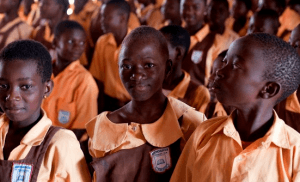Education, crucial for peace building in Africa
 Stakeholders at the Pan-African Symposium on Education, Resilience and Social Cohesion, say ensuring equitable access to education is key in addressing the root causes of conflict and instability in Africa.
Stakeholders at the Pan-African Symposium on Education, Resilience and Social Cohesion, say ensuring equitable access to education is key in addressing the root causes of conflict and instability in Africa.
The three-day symposium at the United Nations Conference Centre in Addis Ababa would share the evidence and best practices from UNICEF’s Peacebuilding, Education and Advocacy Programme (PBEA), and the Inter-Country Quality Node (ICQN) on Peace Education, established by the Association for the Development of Education in Africa (ADEA).
The symposium would seek to assess how inclusive, equitable and innovative education policy and programmes could contribute to sustainable peace and development across the continent.
Currently, three out of 10 children in Africa are living in conflict-affected settings and exposed to numerous risks.
Leila Gharagozloo-Pakkala, UNICEF’s Regional Director for Eastern and Southern Africa, said the capacity of education to support children develop and thrive is well documented, “however we now also know that education can prevent and reduce the impacts of conflict”.
“If the right policies and interventions are in place, together with financial investment, education can be a driving force in achieving the Sustainable Development Goals.”
In Sub-Saharan Africa, 36 out of 45 countries are at medium or high risk of experiencing manmade disasters, the highest rate globally.
Moreover, at least 327 million children in Sub-Saharan Africa live in fragile contexts and the majority of the estimated 29 million primary school aged children who are out of school are primarily found in fragile settings and are particularly at risk or threatened by conflict.
“We need to re-orient Africa’s education and training systems to meet the knowledge, competencies, skills, innovation and creativity required to nurture the continent’s core values,” said Dr Martial de Paul Ikounga, African Union Commissioner for Human Resources, Science and Technology.
“We will then promote sustainable development at the national, sub-regional and continental levels.”
The African Union Commission, under the Agenda 2063 “The Africa We Want”, envisions that by 2020 “all guns would be silent and a culture of peace and tolerance would be nurtured in Africa´s children and youth through peace.”
Oley Dibba-Wadda, the Executive Secretary of ADEA, sees education as “a key tool against all kinds of violence” and strongly appeals to African governments to “endorse and develop integrated, peaceful, inclusive approaches and strategies that support the implementation of a comprehensive programme on non-violence, tolerance and peace, especially for the young generation.”
The high-level event in Addis Ababa, which is being attended by Ministers of Education from 16 African countries, including conflict-torn states.
It would close with concrete recommendations on how to strengthen education sector policy and programmes in Africa to address the risks faced by children and to support sustainable peace and development across Africa.
The symposium would also provide evidence to inform both donor and public funding strategies and investment priorities.
Ato Shiferaw Shigute, Minister of Education, said; “Education can play both a protective and preventative role. In doing this, education’s power is transformative and serves as a peace dividend, reducing inequities and grievances between groups and strengthening social cohesion.”
The symposium is co-organized by the Federal Democratic Republic of Ethiopia’s Ministry of Education, UNICEF, the ADEA and the ICQN on Peace Education.
Source: GNA
